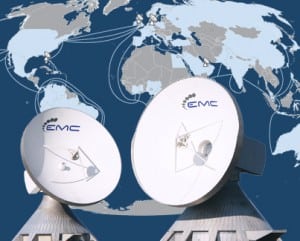EMC Exec Highlights Market Potential in Brazil
[Via Satellite 09-10-2014] Emerging Market Communications (EMC) is seeing strong growth in Brazil, as the company looks to boost its presence in Latin America while riding the momentum of recent contract wins and a notable regional acquisition. Jesus Barber, EMC’s VP of maritime and mobility told Via Satellite that the company has a strong “strategic focus” on Brazil as it prioritizes this market.
“Brazil’s large economy and economic growth in the telecommunications and offshore oil and gas segments have led us to making the opportunities here a priority. We partner with local telecommunications companies to provide services to end users in all regions. Today, EMC provides fully managed, satellite (VSAT) and terrestrial connectivity solutions to over 3,200 customer remote sites in Brazil, both onshore and offshore,” he said.
Earlier this year, the company signed a major deal with the Brazilian Navy (Marinha do Brasil) to provide VSAT satellite connectivity services for its entire fleet. EMC will deliver services using its Global Ku-band network, allowing seamless roaming across undefined routes in varying satellite beams. This satellite communications service incorporates EMC’s Satlink technology and enables high speed, secure Wi-Fi, Voice Over IP (VoIP), video conferencing, and real time management, supported by EMC engineers and the company’s Global Operations Center, available 24 hours, 7 days per week.
Last year EMC acquired STM and its affiliate entities Global IP and Vodanet Brasil. Global IP is a global satellite connectivity services provider, specializing in the mobility, maritime and oil and gas markets. Vodanet serves as an operating company in Brazil, and is fully licensed to provide VSAT services both onshore and offshore. The Vodanet acquisition, in particular, also strengthens EMC’s position in Brazil.
Barber said the oil and gas and maritime markets are where the company sees some of the strongest avenues for growth.
“Global companies in the oil and gas, maritime and telecommunications verticals in particular are expanding operations in Brazil and require fully managed communications services rather than equipment installations,” he said. “This allows EMC to help our customers manage the full spectrum of their communications solution, from designing the network, to installation, to monitoring and maintenance. Maritime and offshore oil and gas solutions are often challenging and require high levels of expertise for proper operation including challenging installations with limited space aboard vessels and specified network requirements to maintain reliability while at sea.”
The company has been present in the Brazil for around 12 years. Aside from the contract with the Brazilian Navy, the company has also had other successes recently with the two largest telecommunications companies in Brazil.
“We will have full responsibility for providing VSAT services, including equipment supply, installations and maintenance for the end users of these companies’ services, which will result in hundreds of new customer sites for us by the end of 2015. Another focus of ours includes a few state government entities that have requested our services,” said Barber.
With a slew of contracts, and a growing economy, there is high potential for EMC in Brazil. Barber believes that over the next two years the Brazilian market for satellite services will continue its growth due to the current lack of availability and the need for communications solutions in many regions, particularly in the corporate arena. The lack of terrestrial infrastructure presents a number of opportunities for network services companies like EMC.
“Other growth opportunities are in the markets of TV/video broadcast, due to the increased interest in distance learning as well as the class shift, allowing more consumers the ability to purchase television sets at home,” said Barber. “The next five years will also bring additional opportunities for oil and gas companies and offshore Brazil exploration, but we should also see several initiatives focusing on Ka-band services being made available for the first time.”
